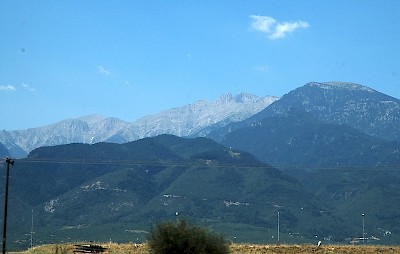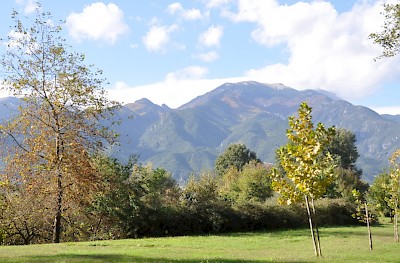Olympus - Livius (original) (raw)
This page is a stub. It will be expanded to a full-fledged article.
Mount Olympus (Greek Ὂλυμπος): mountain in northern Greece, between Thessaly and Macedonia, believed to be the dwelling of the gods.
Mountain
Mount Olympus, seen from the northwest, with the "Throne of Zeus" in the center.
Situated close to the sea, often covered with snow, and rising more than 2900 meters, the Olympus is one of the most impressive mountains of the ancient world. It is essentially a platform at a height of 2300-2400 meters, with summits rising to 2918 meters. The poet Homer already was aware of the fact that there were several summits, because he uses the plural several times.note[Homer, Iliad 1.44, 2.167, 4.74.] In his biography of the Roman general Aemilius Paulus, the Greek philosopher Plutarch includes an inscription by a man who had measured the mountain's height from a place called Pythium:
The sacred peak of Olympus, at Apollo's Pythium
has a height, in perpendicular measurement, of ten full stades,
and besides, a hundred feet lacking only four.
It was the son of Eumelus who measured the distance, Xenagoras;
so fare thee well, O King, and be propitious in thy gifts.note[Plutarch, Aemilius Paulus 15.10.]
In other words: the summit was about 1825 meters above Pythium. Because this place is at a height of 900 meters, Xenagoras' measurement is fairly accurate.
One of the summits resembles the slightly curved backrest of a chair and is called the Throne of Zeus. Immediately east of the mountain is the Aegean Sea; the narrow coastal strip is the main road from Thessaly (which enters the coastal plain through the Tempe Canyon between Olympus and Ossa) to Macedonia in the north.
Myth
Mount Olympus, seen from Drion
According to Homer, Mount Olympus was the place where Zeus and the other Olympian deities had their palaces. The site was surrounded by a wall with gates and taken care of by the Horae.note[Homer, Iliad 5.749-751.] This place at the same time on the real Mount Olympus and in the sky; the words "Olympus" and "Ouranos" (heaven) were synonymous.
On one of the summits, dedicated to Saint Anthony (Aghios Antonios) and at a height of about 2800 meters, an ancient shrine has been found. A couple of inscriptions and large amounts of pottery prove that this place was used for worship in the fourth century BCE. One coin, minted by Antigonus II Gonatas (r.283-239), documents a visitor in the Hellenistic period.
The word "Olympus" is pre-Greek and used for more mountains than the one in northern Greece: there are Olympi on Crete and on Cyprus, in Lycia and in Mysia, on Euboea and on Lesbos ;as well.

